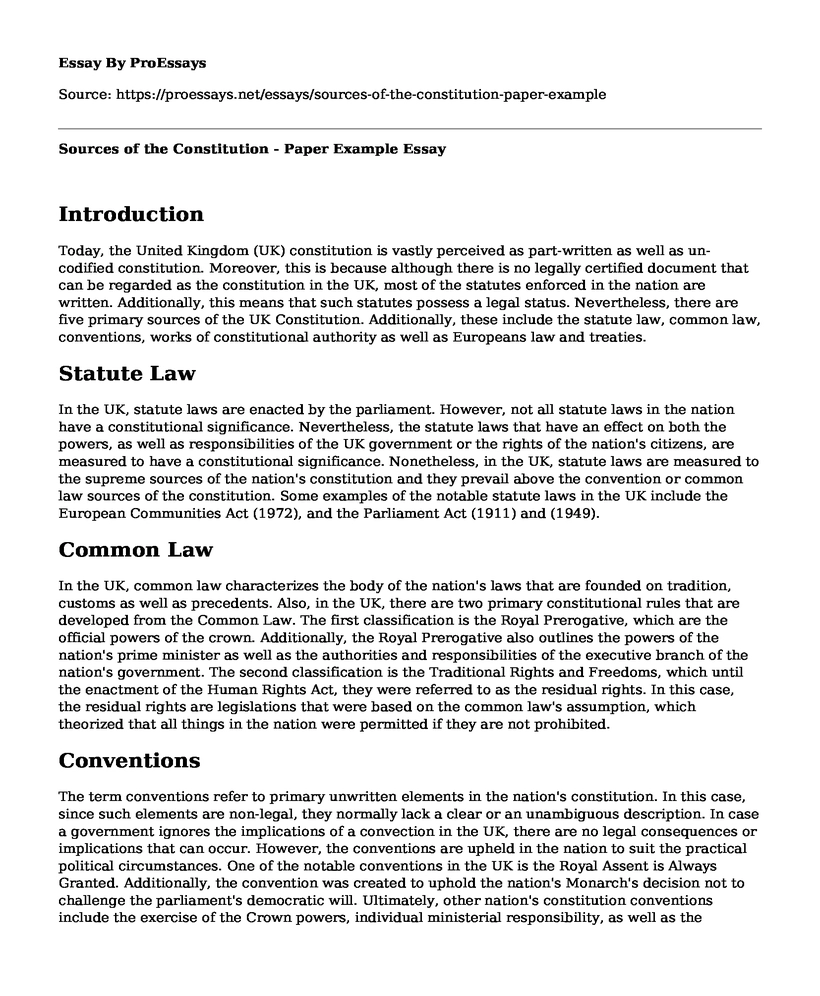Introduction
Today, the United Kingdom (UK) constitution is vastly perceived as part-written as well as un-codified constitution. Moreover, this is because although there is no legally certified document that can be regarded as the constitution in the UK, most of the statutes enforced in the nation are written. Additionally, this means that such statutes possess a legal status. Nevertheless, there are five primary sources of the UK Constitution. Additionally, these include the statute law, common law, conventions, works of constitutional authority as well as Europeans law and treaties.
Statute Law
In the UK, statute laws are enacted by the parliament. However, not all statute laws in the nation have a constitutional significance. Nevertheless, the statute laws that have an effect on both the powers, as well as responsibilities of the UK government or the rights of the nation's citizens, are measured to have a constitutional significance. Nonetheless, in the UK, statute laws are measured to the supreme sources of the nation's constitution and they prevail above the convention or common law sources of the constitution. Some examples of the notable statute laws in the UK include the European Communities Act (1972), and the Parliament Act (1911) and (1949).
Common Law
In the UK, common law characterizes the body of the nation's laws that are founded on tradition, customs as well as precedents. Also, in the UK, there are two primary constitutional rules that are developed from the Common Law. The first classification is the Royal Prerogative, which are the official powers of the crown. Additionally, the Royal Prerogative also outlines the powers of the nation's prime minister as well as the authorities and responsibilities of the executive branch of the nation's government. The second classification is the Traditional Rights and Freedoms, which until the enactment of the Human Rights Act, they were referred to as the residual rights. In this case, the residual rights are legislations that were based on the common law's assumption, which theorized that all things in the nation were permitted if they are not prohibited.
Conventions
The term conventions refer to primary unwritten elements in the nation's constitution. In this case, since such elements are non-legal, they normally lack a clear or an unambiguous description. In case a government ignores the implications of a convection in the UK, there are no legal consequences or implications that can occur. However, the conventions are upheld in the nation to suit the practical political circumstances. One of the notable conventions in the UK is the Royal Assent is Always Granted. Additionally, the convention was created to uphold the nation's Monarch's decision not to challenge the parliament's democratic will. Ultimately, other nation's constitution conventions include the exercise of the Crown powers, individual ministerial responsibility, as well as the collective ministerial responsibility among others.
Works of Constitutional Authority
In the UK, professionals who are considered to be experts in the nation's constitution are consulted by the national authorities on various constitutional issues. Additionally, such professionals help in determining whether various legislations or policies practiced in the nation in various scenarios are constitutionally proper or correct. Nevertheless, although such statutes are mainly written, they are not considered to be legally enforceable. Ultimately, the works of constitutional authority in the UK are required for two fundamental reasons. First, they are needed to provide a clarification on how general rules, as well as principles that are ambiguous in the un-codified constitution, should be applied into practice. Second, the works are employed to provide a clarification of what various statutes of the UK's constitution actually means.
Cite this page
Sources of the Constitution - Paper Example. (2022, Jun 15). Retrieved from https://proessays.net/essays/sources-of-the-constitution-paper-example
If you are the original author of this essay and no longer wish to have it published on the ProEssays website, please click below to request its removal:
- Articles Analysis Essay on Ecology
- The Use of Bank's Four Approaches to Integration of Multicultural Into the School Programmes
- Areas That Blair-Brown Governments Continue Reverse Conservative Social Policies
- The Restructuring of the U.S. Health Care Delivery - Research Paper
- U.S. Health Care: Politics and Policy Impact on Quality Care - Essay Sample
- Essay Example on 2008: Obama Busts Into US Presidential Politics
- Essay Sample on Privacy Policy: Understanding How Your Data is Protected







